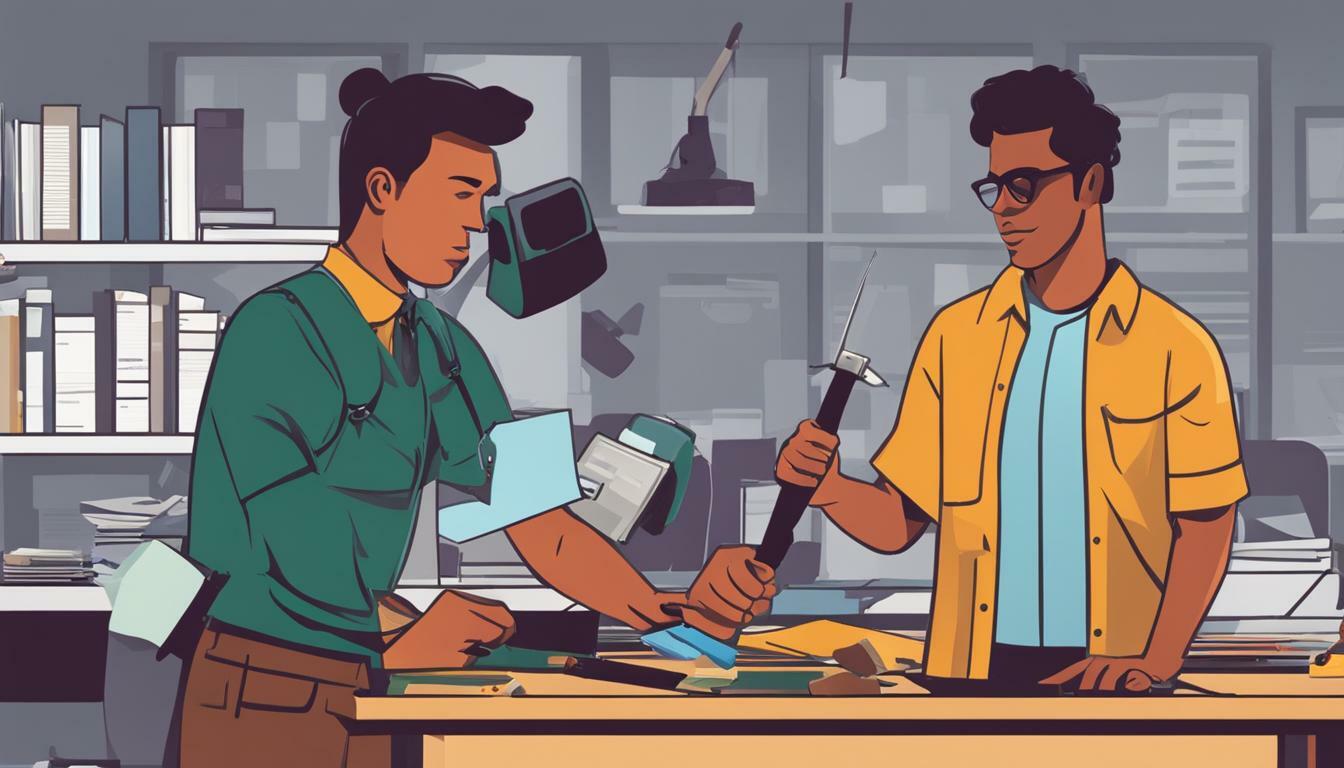Master Credit Repair for Self-Employed Individuals Today

Are you a self-employed individual looking to master credit repair and improve your financial standing? Managing your credit is essential for securing loans, mortgages, and other financial opportunities. This is especially important for self-employed individuals, as their creditworthiness can directly impact their business ventures and personal finances.
Repairing your credit as a self-employed individual requires a unique approach, taking into account the challenges and circumstances that come with being your own boss. By understanding the intricacies of credit repair and implementing effective strategies, you can take control of your financial future and unlock greater opportunities.
Key Takeaways:
- Managing your credit is crucial for self-employed individuals to secure financial opportunities.
- Repairing your credit as a self-employed individual requires a tailored approach.
- Effective strategies include reviewing credit reports, disputing errors, and making payment arrangements.
- Researching and choosing a legitimate credit repair company can provide assistance if needed.
- Developing a comprehensive plan and improving overall credit habits is essential for long-term success.
Understanding Credit Repair for Self-Employed Individuals
As a self-employed individual, understanding the intricacies of credit repair is essential for improving your credit score and achieving financial stability. Credit repair is the process of fixing inaccuracies and errors in your credit report to improve your creditworthiness and increase your chances of getting approved for loans, credit cards, and favorable interest rates.
One of the key challenges for self-employed individuals in credit repair is the documentation required to verify income and financial stability. Unlike traditional employees who receive regular pay stubs, self-employed individuals might have irregular income streams and varied sources of revenue. This can make it more challenging to demonstrate financial responsibility to lenders and credit bureaus.
🚨 TUIC Errors + Low Credit Score?
CreditScoreIQ helps you build credit faster by reporting utility bills to all 3 bureaus—while you dispute errors.
Start Building Credit Today →When repairing your credit as a self-employed individual, it’s important to obtain your credit reports from the three major credit bureaus – Experian, Equifax, and TransUnion. Review your reports carefully, looking for errors, inaccuracies, or outdated information that could be negatively impacting your credit score. Common errors include incorrect personal information, duplicate accounts, and accounts that should have been removed after a certain period of time.
Once you’ve identified errors on your credit reports, you can file disputes with the credit bureaus to have them corrected or removed. This process involves submitting a formal request and providing any supporting documentation that proves the inaccuracies. It’s crucial to keep copies of all correspondence and documents related to your dispute for future reference.
Relevant tables:
| Steps to Repair Credit | Actions |
|---|---|
| 1. Obtain credit reports | Request credit reports from Experian, Equifax, and TransUnion. |
| 2. Review reports for errors | Check for inaccuracies, outdated information, or duplicate accounts. |
| 3. File disputes | Submit formal disputes with credit bureaus for incorrect information. |
| 4. Keep documentation | Keep copies of all correspondence and documentation related to disputes. |
| 5. Make payment arrangements | Set up payment plans to bring past-due balances current. |
Repairing your credit score as a self-employed individual requires patience and perseverance. It is important to address any past-due balances and make payment arrangements to minimize the negative impact on your credit. Additionally, developing a comprehensive plan to improve your overall credit habits, such as paying bills on time, keeping credit utilization low, and avoiding unnecessary credit inquiries, will help strengthen your creditworthiness over time.
While you have the option to repair your credit yourself, seeking professional advice from reputable credit repair companies can also be beneficial. However, it is crucial to research and choose a legitimate company to avoid scams or unethical practices. Remember that credit repair is a journey that takes time, commitment, and responsible financial habits. By taking control of your credit repair process, you can pave the way for a brighter financial future as a self-employed individual.

Implementing the right credit repair strategies can help self-employed individuals build a solid credit foundation and overcome financial challenges. Whether you choose to work with a reputable credit repair company or take the DIY approach, there are several tips and techniques that can make a significant difference in improving your credit score.
First, start by obtaining your credit reports from the three major credit bureaus – Equifax, Experian, and TransUnion. Review these reports thoroughly for any errors or inaccuracies that may be dragging down your credit score. Look for items such as late payments, accounts in collections, or incorrect personal information. If you find any discrepancies, file disputes with the credit bureaus to have them corrected or removed.
In addition to disputing inaccuracies, it’s crucial to make payment arrangements for any past-due balances. Late payments can have a negative impact on your credit score, so it’s important to bring these accounts current as soon as possible. Contact your creditors directly to negotiate payment plans or settlements that fit within your budget. Making consistent and timely payments moving forward will show lenders that you are committed to improving your creditworthiness.
Furthermore, consider seeking credit counseling to gain valuable insights and guidance on managing your finances effectively. A credit counselor can help you create a personalized plan to address your specific credit needs and offer valuable tips on budgeting, debt repayment, and credit building. By working with a qualified professional, you can gain a better understanding of your financial situation and develop healthy credit habits that will benefit you in the long run.
Credit Repair Strategies for Self-Employed Individuals
| Strategies | Pros | Cons |
|---|---|---|
| Working with a reputable credit repair company | Access to professional expertise and industry knowledge, saves time and effort, help with complex disputes | Cost involved, potential for scams or unethical practices, limited control over the process |
| DIY credit repair | Complete control over the process, cost-effective, opportunity to learn about personal finances | Time-consuming, requires extensive research and understanding of credit laws and regulations |
“Improving your credit score takes time and effort, but with the right strategies, self-employed individuals can achieve financial success and access better borrowing opportunities.”
Remember, repairing your credit as a self-employed individual may take longer compared to traditional employees, as lenders often consider self-employment as higher risk. Therefore, patience and consistency are key during this process. Stay committed to implementing these credit repair strategies, and you will gradually see positive changes in your credit score and overall financial health.

Making Payment Arrangements and Developing a Plan
Making payment arrangements and creating a well-defined plan are crucial steps in the credit repair process for self-employed individuals. When you have past-due balances, it’s important to take immediate action to bring them current. This not only helps to improve your credit score, but it also demonstrates your commitment to responsible financial management.
Start by contacting your creditors to discuss payment options. Explain your situation and inquire about any payment arrangements they may offer. Many creditors are willing to work with you and may be open to negotiating a reduced payment amount or spreading out payments over a longer period of time.
Once you have reached an agreement with your creditors, it’s essential to develop a comprehensive plan to improve your overall credit habits. This includes creating a budget to ensure that you can make timely payments moving forward. Prioritize your debts based on interest rates and due dates, and allocate funds accordingly. By sticking to your plan and consistently making payments, you can gradually reduce your debt and improve your creditworthiness.
Remember, repairing your credit as a self-employed individual takes time and effort. Stay committed to the process, and don’t hesitate to seek guidance from credit counseling services if you need additional support. With a proactive approach and a well-executed plan, you can successfully repair your credit and pave the way for a brighter financial future.
Summary:
- Making payment arrangements and creating a plan are crucial steps in credit repair for self-employed individuals.
- Contact your creditors to discuss payment options and negotiate arrangements.
- Develop a comprehensive plan to improve your credit habits and prioritize your debts.
- Stay committed and seek guidance if needed to successfully repair your credit.
| Payment Arrangements and Plan | Benefits |
|---|---|
| Bringing past-due balances current | Improves credit score and demonstrates financial responsibility |
| Developing a comprehensive plan | Helps to prioritize debts and manage finances effectively |
| Consistently making payments | Reduces debt gradually and improves creditworthiness |
“Making payment arrangements and creating a well-defined plan are crucial steps in the credit repair process for self-employed individuals.”

Self-Driven Credit Repair versus Hiring Credit Repair Companies
When it comes to credit repair, self-employed individuals have the choice between pursuing the process independently or seeking the assistance of credit repair companies. Both options have their pros and cons, and it’s important to consider your specific situation and needs before making a decision.
Self-Driven Credit Repair:
If you decide to take on credit repair yourself, there are several steps you can follow to improve your credit score. Start by obtaining your credit reports from the three major credit bureaus: Equifax, Experian, and TransUnion. Review the reports carefully for any errors or inaccuracies that could be negatively impacting your credit score.
Once you identify any errors, you can file disputes with the credit bureaus to have them corrected or removed. This process can be time-consuming and requires attention to detail, but it can be effective in improving your credit score. However, it’s important to note that credit repair companies cannot remove accurate information from your credit report.

If you prefer to have professional help with your credit repair journey, you can consider hiring a reputable credit repair company. These companies specialize in navigating the credit repair process and have experience dealing with the credit bureaus on behalf of their clients.
When choosing a credit repair company, it’s essential to do your research and select a legitimate and trustworthy organization. Look for companies that offer transparent services and have positive reviews from past clients. It’s also important to be wary of any company that promises quick and guaranteed results, as credit repair is a gradual process that takes time.
In conclusion, whether you decide to pursue self-driven credit repair or hire a credit repair company, the key is to take action and be proactive in improving your credit. By addressing any inaccuracies, making payment arrangements, and developing a plan to improve your overall credit habits, you can work towards achieving a better financial future.
Conclusion
By implementing the strategies and tips discussed in this article, self-employed individuals can empower themselves to master the art of credit repair and improve their financial standing. Credit repair is the process of fixing inaccuracies and errors in your credit report to enhance your credit score. While there are reputable credit repair companies that can assist in disputing inaccuracies with the credit bureaus, it’s essential to research and select a legitimate company.
Alternatively, you can choose to repair your credit yourself. Start by obtaining your credit reports and carefully reviewing them for any errors. If you spot any inaccuracies, file disputes with the credit bureaus to have them corrected. It’s important to note that credit repair companies cannot remove accurate information from your credit report, so it’s crucial to focus on addressing any errors or discrepancies.
Repairing your credit takes time, so patience is key. Alongside disputing inaccuracies, it’s equally important to make payment arrangements to bring past-due balances current. This will not only help improve your credit score but also demonstrate your commitment to responsible financial management. Additionally, developing a comprehensive plan to enhance your overall credit habits is vital. This plan may include creating a budget, reducing debt, and making timely payments.
Remember, credit repair is a journey that requires dedication and effort. While credit repair companies can provide assistance, taking control of your own financial future is empowering. By following the strategies and advice outlined in this article, self-employed individuals can take charge of their credit repair journey and pave the way for a more secure financial future.
FAQ
What is credit repair?
Credit repair is the process of fixing inaccuracies and errors in your credit report in order to improve your credit score.
How can credit repair companies help?
Reputable credit repair companies can help with the credit repair process by disputing inaccuracies with the credit bureaus.
Can I repair my credit myself?
Yes, you can choose to repair your credit yourself by obtaining your credit reports, reviewing them for errors, and filing disputes with the credit bureaus.
Can credit repair companies remove accurate information from my credit report?
No, credit repair companies cannot remove accurate information from your credit report.
How long does the credit repair process take?
The process of repairing your credit can take time and varies depending on the complexity of your individual situation.
What else can I do to improve my credit?
In addition to disputing inaccuracies, it’s important to make payment arrangements to bring past-due balances current and develop a plan to improve your overall credit habits.
Should I hire a credit repair company or do it myself?
Ultimately, the decision to hire a credit repair company or do it yourself depends on your individual circumstances. It’s important to research and choose a legitimate credit repair company if you decide to go that route.
Ready to Improve Your Credit?
Disputing TUIC errors is step one. Step two? Boost your score by reporting utility payments with CreditScoreIQ.
Get Started Now (Only $1 Trial) →3-bureau reporting • $1M identity insurance • Dark web monitoring



